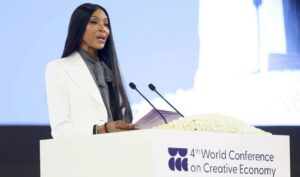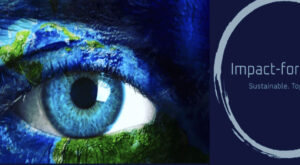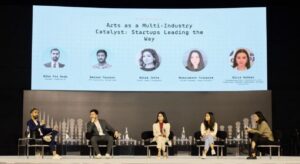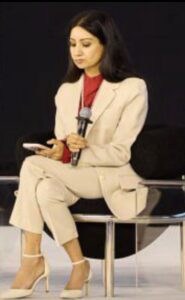Nisaa Jetha Key Panellist at World Conference on Creative Economy – Keynotes Include Naomi Campbell
Nisaa Jetha, an influential Global Impact Strategist, recently served as a panellist at the World Conference on Creative Economy. Hosted by Indonesia’s Ministry of Tourism and Creative Economy in collaboration with UN Trade & Development (UNCTAD) and the World Intellectual Property Organization (WIPO), this pivotal event convened global leaders, policymakers, and innovators to examine the creative economy’s power to drive sustainable and inclusive growth. Supported by partners like the British Council, the conference set the stage for meaningful exchanges about how creativity can underpin resilient industries, unlock new economic pathways, and contribute to a more equitable global landscape.

Naomi Campbell Keynotes at World Conference on Creative Economy
At a time when the creative economy stands as a transformative force in global development, Jetha’s contributions were integral to discussions on creativity’s critical role in fuelling economic growth, sustainability, and social impact. Her insights cantered on the potential of arts, culture, technology, and innovation to act as solutions for many of the world’s most pressing issues, from environmental challenges to economic disparity. With industries increasingly acknowledging creativity as a cornerstone for long-term success, this conference presented an invaluable platform for exploring how the creative sector could address challenges that transcend sectors and national borders. The event underscored creativity’s unique ability to connect people, ideas, and resources in ways that drive systemic change.


Nisaa Jetha Represents ImpactforSDGs
The World Conference on Creative Economy featured a remarkable line-up of speakers who each brought unique perspectives on how the creative economy could serve as a vehicle for progress:
- Naomi Campbell – The supermodel, actress, and media icon discussed her role in leveraging influence and creativity across various industries, emphasizing the need to harness creative power for positive societal impact.
- Arizona Muse – As a model and eco-activist, Muse offered perspectives on fashion’s intersection with sustainability and ethical consumption, stressing the importance of a conscious approach to creativity.
- Marie-Claire Chappet – Contributing Editor at Harper’s Bazaar, Chappet reflected on the evolving media landscape, sharing insights into how storytelling shapes public perception and influences the creative economy.
- Amina J. Mohammed – The Deputy Secretary-General of the United Nations and Chair of the UN Sustainable Development Group discussed the creative sector’s vital role in advancing the UN’s Sustainable Development Goals, underlining its potential as a force for global sustainability.
- Rebeca Grynspan – The Secretary-General of UNCTAD addressed the importance of creative industries in international trade and economic resilience, emphasizing the economic value of creativity in an interconnected world.
- Sylvie Forbin – Deputy Director General for Copyright and Creative Industries at WIPO, who explored the complexities of intellectual property in today’s digital age, highlighting the need to protect creative rights in a rapidly evolving landscape.
- Sandiaga S. Uno – Indonesia’s Minister of Tourism and Creative Economy, reflecting on how creativity fuels Indonesia’s economic strategy, positioning it as a critical factor in the country’s growth and international engagement.
- Sheikha Al-Mayassa bint Hamad bin Khalifa Al Thani – Chairperson of Qatar Museums, shared how Qatar harnesses culture and creativity to foster innovation and leadership, establishing the arts as central to the nation’s vision for the future.
- John Howkins – A global strategist and acclaimed author, widely recognized for his work on the creative economy’s potential, provided insights into how creativity can redefine business models and drive industry growth.
- Daniar Amanaliev – Co-founder of the ololo Group, Amanaliev illustrated how entrepreneurship and creativity can invigorate economies, bringing local and regional insights into the broader global conversation

This World Conference on Creative Economy represented a powerful convergence of voices from government, culture, international organizations, media, and private industry. It recognized that the creative economy transcends the arts, forming an ecosystem that bridges government, diplomacy, technology, finance, and education. Participants explored how this multifaceted economy could generate economic resilience, foster cross-sector partnerships, and encourage the use of creativity to address complex challenges such as economic disparity, environmental crises, and cultural preservation.
Nisaa Jetha, representing Impact-for-SDGs, underscored the role of creative industries in promoting cultural diplomacy, social innovation, and sustainable growth. Her focus highlighted the dynamic connections between the creative economy and sectors such as technology, digital media, tourism, design, and policymaking, showcasing how creativity acts as a unifying force that drives progress across all facets of society. Jetha emphasized that by harnessing creativity’s potential to unite diverse industries, societies could advance inclusive growth, build stronger partnerships, and foster positive change on a global scale.

“In a gathering that leveraged the collective wisdom and experiences of participants from around the world, the World Conference on Creative Economy championed forward-looking strategies to cultivate a more inclusive, impactful, and sustainable creative economy. This vision resonates across industries, communities, and continents, reinforcing the idea that creativity is not just an industry but a vital, transformative force that can redefine societal progress and bridge cultural divides.” – Nisaa Jetha, Global Impact Strategist

